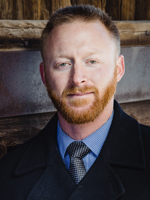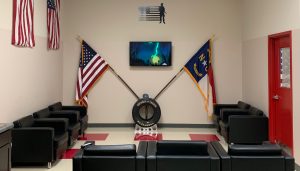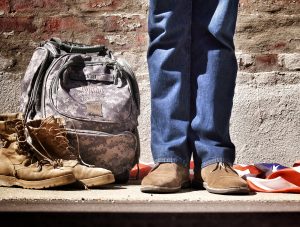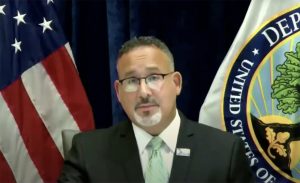Put yourself on a college campus studying for an upcoming exam. While you sit at a table in the library every time a person walks in you have to assess them and determine friend or foe. You are taking a test related to medicine and every question you read reminds you of patients from the past you treated, and you answer those questions based on a mix of the information in the question and memories of similar events. During a course of instruction, a power point on any topic, you suddenly tear up unsure of why or how to make it stop. These are just a few of the untold realities for Student Veterans. Lack of dedicated study space, difficulty in getting testing accommodations, and unchecked PTSD can all interfere with the success and experience of a Student Veteran.
As a graduate student I came out of a warrior transition battalion, and within months I was sitting in a Physician Assistant school seat. I thought the Special Forces medic course was like drinking from a fire hose, but this was another level. I think a lot of that difficulty came from an untreated TBI and PTSD. What I used to be able to learn and memorize became a monumental task and things just wouldn’t stick. It wasn’t until I linked up with Dr. Mark Gordon and the Warrior Angels Foundation and started to receive treatment for hormonal deficiencies secondary to TBI that my memory began to regain its shape.
Now that my memory improved and I was starting to hold onto information, I engaged with other students to form study groups. Unfortunately, our university was tight on study rooms, so we would have to study in open areas or places like the cafeteria. While in these places I noticed that I was constantly distracted by people walking through, or identifying what others were doing in the room. This is natural to do, but the difference was that it took me longer to refocus back to the topic being discussed. It was to the point that if there was not a room available, I would just go home to attempt to study the material on my own and hope that it was enough.
Organizations have focused on improving access to programs that ensure that our Veterans are able to achieve educational success. The next step is to create optimized learning environments for those Veteran Students. Every school is different and will have unique requirements. The Veteran Education Project has the insight, proficiency, and capability to help institutions identify short-comings and provide solutions that create more Veteran friendly learning environments.
 Ryan is a Physician Assistant and a Special Forces Medical Sergeant with the California National Guard. He has led US and foreign troops in combat as well as having run successful start-up businesses. He has 2 associate degrees, a bachelor’s degree, and a master’s degree that were all obtained as a Student Veteran. He has attended numerous universities and experienced firsthand, what works and doesn’t work. Ryan has dealt with and understands many of the issues currently faced by our Veterans when it comes to education.
Ryan is a Physician Assistant and a Special Forces Medical Sergeant with the California National Guard. He has led US and foreign troops in combat as well as having run successful start-up businesses. He has 2 associate degrees, a bachelor’s degree, and a master’s degree that were all obtained as a Student Veteran. He has attended numerous universities and experienced firsthand, what works and doesn’t work. Ryan has dealt with and understands many of the issues currently faced by our Veterans when it comes to education.




